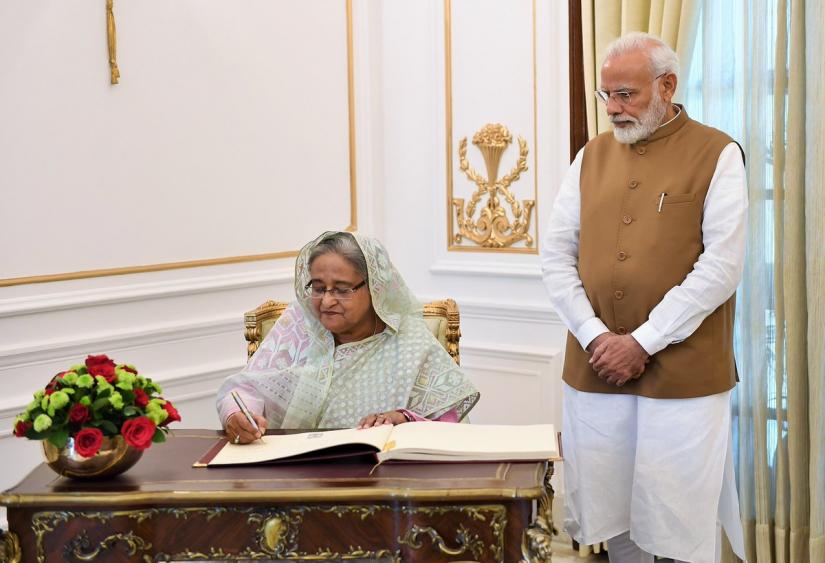 Prime Minister Sheikh Hasina has much to be pleased about her visit to India which also made Bangladeshis proud of their leader who placed all her concerns on the table of her counterpart Narendra Modi.
Prime Minister Sheikh Hasina has much to be pleased about her visit to India which also made Bangladeshis proud of their leader who placed all her concerns on the table of her counterpart Narendra Modi.
Nothing that concerns her people was left out. Her body language made it clear that she was in command and India, as a big neighbour had much to do to make bilateral ties indeed an example for the world as Modi claimed.
Thus many congratulations go to the prime minister who has proved in every way, that she has been truly a worthy daughter of Bangabandhu Sheikh Mujibur Rahman. Her domestic ratings went up sharply after she launched a crackdown against corruption and illegal activities in her own turf - the ruling Awami League.
A look at the joint statement issued after the official talks between Hasina and Modi reveals that issues of Rohingya repatriation, the sharing of Teesta river water, terrorism and border killings, were arrested in detail.
I have written before her trip that this was not a journey to achieve anything, but to further cement bilateral ties and a face=to=face meet with her counterpart after they won in recent general elections. Even so, she scored high and thus her critics were caught by surprise and many of them praised her diplomacy.
Also revealing were her comments on the shortage of onion back home causing “difficulties” for her people and that she had told her cook not to use the important food ingredient.
Shamsher M Chowdhury, former foreign secretary and ex-leader of the opposition Bangladesh Nationalist Party (BNP), was all praise for her.
“The onion comment carried a tough a message that under international agreements such a ban is improper and Bangladesh can do without Indian onions,” he said in a TV talk show.
Indeed onions were ordered from Myanmar and Turkey on an emergency basis.
 Hours after her comment a spokesman for the Indian External Affairs Ministry told a press brief in New Delhi that his government took note of what Sheikh Hasina had said about the sudden ban on Indian onion export to Bangladesh. Proper steps to “accommodate” her concerns were being taken. Informed sources in New Delhi told this author that most likely the ban would be lifted for Bangladesh before the two leaders met for official talks.
Hours after her comment a spokesman for the Indian External Affairs Ministry told a press brief in New Delhi that his government took note of what Sheikh Hasina had said about the sudden ban on Indian onion export to Bangladesh. Proper steps to “accommodate” her concerns were being taken. Informed sources in New Delhi told this author that most likely the ban would be lifted for Bangladesh before the two leaders met for official talks.
Truckloads of onions under pre-ban Letter of Credit were readied to enter Bangladesh under special arrangements, while normal exports were resumed before the talks.
That and the rest of what we might call “Sheikh Hasina diplomacy” is for posterity to remember
Sheikh Hasina also won Indian support to ensure the return of some 1.4 million Rohingyas back to Myanmar. Modi told her that India was already working to develop the Rakhine state for the return of the displaced Myanmar citizens who must have the security of life back home.
On the issue of border killings, both leaders agreed to make it a “tranquil, stable and crime-free” frontier and directed their respective border forces to complete fencing at all points of the International border and to enhance “coordinated measures to work toward bringing such border incidents down to zero.”
Sheikh Hasina noted that the “people of Bangladesh are awaiting early implementation of the Framework of Interim Agreement for sharing of the Teesta waters, as agreed upon by both the governments in 2011.” Modi on his part assured of an early settlement of the issue and his government was “working” with all stakeholders.
By agreeing to Indian request of 1,82cuses of water from the Feni river to ensure safe drinking water for the people of Sabroon town of Tripura state, Bangladesh showed how it considered the matter as a humanitarian one as a large number of people were in “difficulties” for the shortage of water. Thus, New Delhi has to act on the Teesta river issue, if for nothing else but to lessen the “difficulties” of Bangladeshis who were left high and dry due to the same reasons. Another great diplomatic stroke!
The other burning issue of the time was the Rohingya crisis.
After winning almost universal support on the Rohingya issue, (including china) before and during the United Nations General Assembly session, Sheikh Hasina got India on her side which was a major change in the neighbouring countries' earlier stand of keeping aloof from the issue.
New Delhi was now involved in developing the Rakhine state and taking security measures to facilitate the return of the Rohingyas.
M Shahiduzzaman of the Dhaka University's International Relations faculty termed the visit as a “watershed ... a turning point” of ties between Dhaka and New Delhi.
“She embarrassed her hosts and made her points clear as to how the ties could be made even better, including the mention of 2011 Teesta water interim agreement. This shows her maturity in diplomacy as well as international politics,” he said, despite his reputation as a critic of the government on some issues.
Nadeem Qadir is the Consulting Editor, Daily Sun and a UN Dag Hammarskjöld fellow.


